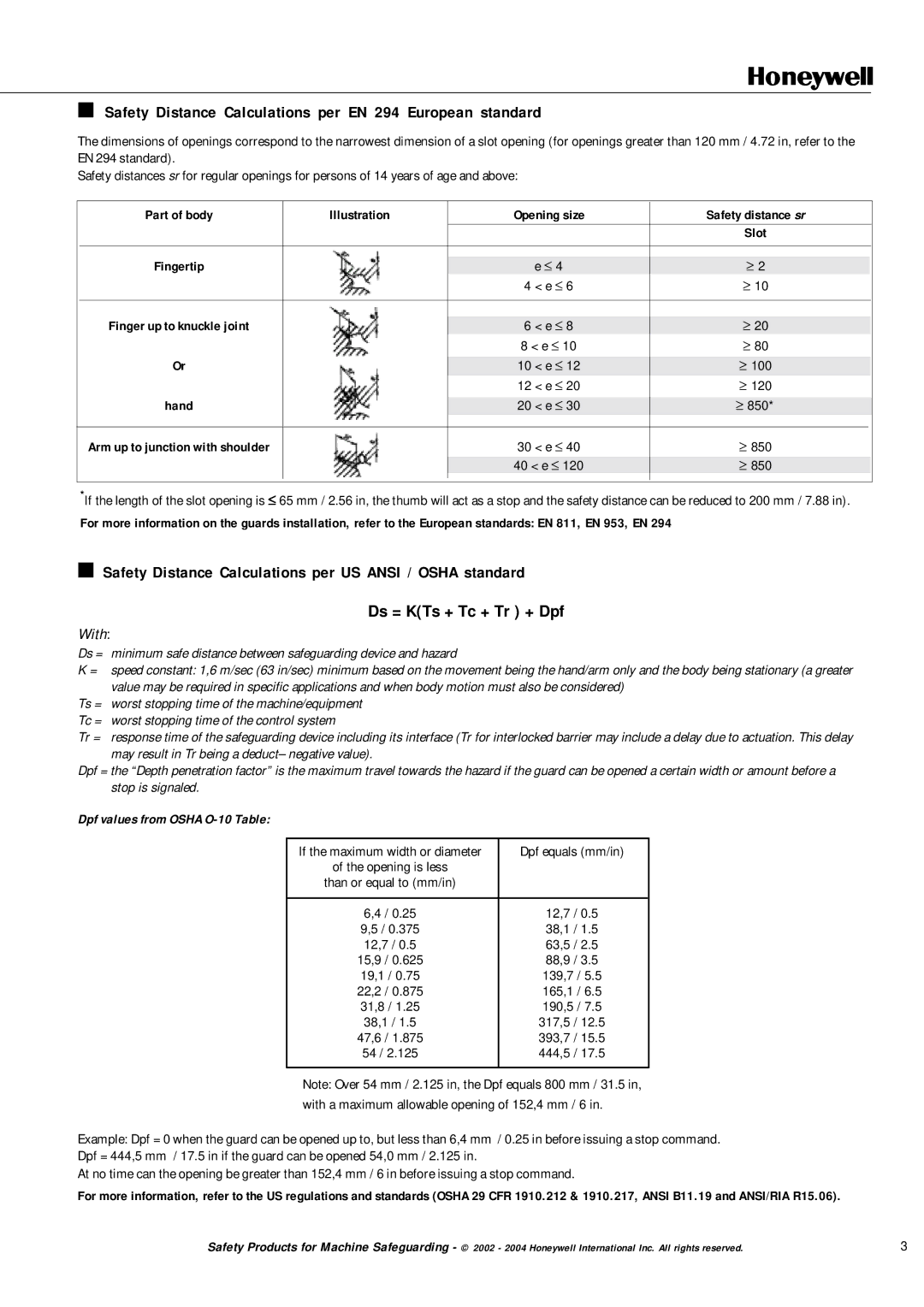
■Safety Distance Calculations per EN 294 European standard
The dimensions of openings correspond to the narrowest dimension of a slot opening (for openings greater than 120 mm / 4.72 in, refer to the EN 294 standard).
Safety distances sr for regular openings for persons of 14 years of age and above:
Part of body | Illustration | Opening size | Safety distance sr |
| |||
|
|
|
|
|
|
| |
|
|
|
|
| Slot |
| |
|
|
|
|
|
|
|
|
|
|
|
|
|
|
|
|
Fingertip |
|
| e ≤ 4 |
|
| ≥ 2 |
|
|
| 4 | < e ≤ | 6 | ≥ | 10 |
|
|
|
|
|
|
|
|
|
|
|
|
|
|
|
|
|
Finger up to knuckle joint |
| 6 | < e ≤ | 8 | ≥ | 20 |
|
|
| 8 < e ≤ | 10 | ≥ | 80 |
| |
Or |
|
|
|
|
|
|
|
| 10 | < e ≤ | 12 | ≥ | 100 |
| |
|
| 12 | < e ≤ | 20 | ≥ | 120 |
|
hand |
|
|
|
|
|
|
|
| 20 | < e ≤ | 30 | ≥ | 850* |
| |
|
|
|
|
|
|
|
|
Arm up to junction with shoulder |
| 30 | < e ≤ | 40 | ≥ | 850 |
|
|
|
|
|
|
|
| |
|
| 40 < e ≤ | 120 | ≥ | 850 |
| |
|
|
|
|
|
|
|
|
|
|
|
|
|
|
|
|
*If the length of the slot opening is ≤ 65 mm / 2.56 in, the thumb will act as a stop and the safety distance can be reduced to 200 mm / 7.88 in).
For more information on the guards installation, refer to the European standards: EN 811, EN 953, EN 294
■Safety Distance Calculations per US ANSI / OSHA standard
Ds = K(Ts + Tc + Tr ) + Dpf
With:
Ds = minimum safe distance between safeguarding device and hazard
K = speed constant: 1,6 m/sec (63 in/sec) minimum based on the movement being the hand/arm only and the body being stationary (a greater value may be required in specific applications and when body motion must also be considered)
Ts = worst stopping time of the machine/equipment Tc = worst stopping time of the control system
Tr = response time of the safeguarding device including its interface (Tr for interlocked barrier may include a delay due to actuation. This delay may result in Tr being a deduct– negative value).
Dpf = the “Depth penetration factor” is the maximum travel towards the hazard if the guard can be opened a certain width or amount before a stop is signaled.
Dpf values from OSHA O-10 Table:
If the maximum width or diameter | Dpf equals (mm/in) | ||
of the opening is less |
|
| |
than or equal to (mm/in) |
|
| |
|
|
|
|
6,4 | / 0.25 | 12,7 | / 0.5 |
9,5 / 0.375 | 38,1 | / 1.5 | |
12,7 / 0.5 | 63,5 | / 2.5 | |
15,9 | / 0.625 | 88,9 | / 3.5 |
19,1 / 0.75 | 139,7 / 5.5 | ||
22,2 | / 0.875 | 165,1 / 6.5 | |
31,8 / 1.25 | 190,5 / 7.5 | ||
38,1 / 1.5 | 317,5 | / 12.5 | |
47,6 | / 1.875 | 393,7 | / 15.5 |
54 / 2.125 | 444,5 | / 17.5 | |
|
|
|
|
Note: Over 54 mm / 2.125 in, the Dpf equals 800 mm / 31.5 in, with a maximum allowable opening of 152,4 mm / 6 in.
Example: Dpf = 0 when the guard can be opened up to, but less than 6,4 mm / 0.25 in before issuing a stop command. Dpf = 444,5 mm / 17.5 in if the guard can be opened 54,0 mm / 2.125 in.
At no time can the opening be greater than 152,4 mm / 6 in before issuing a stop command.
For more information, refer to the US regulations and standards (OSHA 29 CFR 1910.212 & 1910.217, ANSI B11.19 and ANSI/RIA R15.06).
Safety Products for Machine Safeguarding - © 2002 - 2004 Honeywell International Inc. All rights reserved. | 3 |
